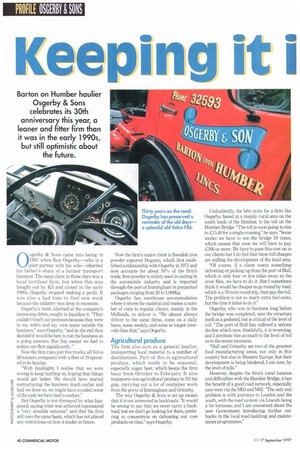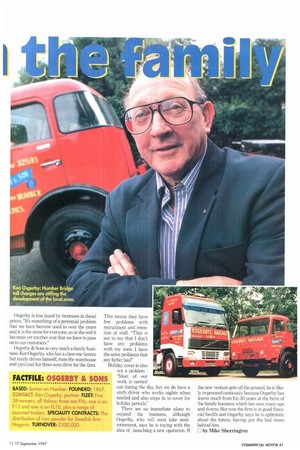Keeping it 1 O sgerby & Sons came into being in
Page 52

Page 53

If you've noticed an error in this article please click here to report it so we can fix it.
1967 when Ken Osgerby—who is a joint partner with his wife—inherited his father's share of a former transport business. The main client in those days was a local fertiliser firm, but when this was bought out by ICI and closed in the early 1990s, Osgerby stopped making a profit. It was also a bad time to find new work because the industry was deep in recession.
Osgerby's bank, alarmed at the company's increasing debts, sought to liquidate it. "They couldn't touch our premises because they were in my wife's and my own name outside the business," says Osgerby, "and in the end they decided it would be best to run the business as a going concern. But this meant we had to reduce our fleet significantly ."
Now the firm runs just five trucks, all Volvo 38-tonners, compared with a fleet of 19 operated in its heyday.
With hindsight, I realise that we were wrong to keep battling on, hoping that things would get better. We should have started restructuring the business much earlier and had we done so, we might have avoided some of the pain we have had to endure."
But Osgerby is not dismayed by what happened, saying what was achieved represented a "very sensible outcome" and that his firm still uses the same bank, which has not placed any restrictions on how it trades in future. Now the firm's major client is Swedish iron powder exporter Hoganis, which first established a relationship with Osgerby in 1971 and now accounts for about 50% of the firm's trade. Iron powder is widely used in casting in the automobile industry and is imported through the port of Immingham in prepacked packages ranging from 20 to 1,000kg.
Osgerby has warehouse accommodation where it stores the material and makes a number of runs to regular clients, mainly in the Midlands, to deliver it. "We almost always deliver to the same firms, some on a daily basis, some weekly, and some at longer intervals than that," says Osgerby.
Agricultural produce
The firm also acts as a general haulier, transporting local material to a number of destinations. Part of this is agricultural produce, which tends to be seasonal, especially sugar beet, which keeps the firm busy from October to February. It also transports non-agricultural produce to fill the gap, carrying out a lot of container work from the ports of Immingham and Grimsby.
The way Osgerby & Sons is set up means that it is not interested in backloads. "It would be wrong to say that we never carry a backload, but we don't go looking for them, preferring to concentrate on delivering our core products on time," says Osgerby. Undoubtedly, the bete noire for a firm like Osgerby, based in a mainly rural area on the south bank of the Humber, is the toll on the Humber Bridge. "The toll is soon going to rise to £15.40 for a single crossing," he says. "Some weeks we have to use the bridge 10 times, which means that soon we will have to pay £300 or more. We have to pass this cost on to our clients but I do feel that these toll charges are stifling the development of the local area.
"Of course, if a client wants something delivering or picking up from the port of Hull, which is only four or five miles away as the crow flies, we have to do it. But I sometimes think it would be cheaper to go round by road, which is a 70-mile round trip, than pay the toll. The problem is not so much extra fuel costs, but the time it takes to do it."
Osgerby, who was in business long before the bridge was completed, sees the structure itself as a godsend, but is critical of the level of toll. "The port of Hull has suffered a serious decline which now, thankfully, it is reversing, and I attribute this as much to the level of toll as to the recent recession.
"Hull and Grimsby are two of the greatest food manufacturing areas, not only in this country but also in Western Europe, but their development is being hindered, I am sure, by the level of tolls."
However, despite the firm's rural location and difficulties with the Humber Bridge, it has the benefit of a good road network, especially east-west via the M63 and M62. "The only real problem is with journeys to London and the south, with the road system via Lincoln being a bit tortuous, and I am concerned about the new Government introducing further cutbacks in the local road-building and maintenance programmes."
Osgerby is less fazed by increases in diesel prices. "It's something of a perennial problem that we have become used to over the years and it is the same for everyone, so in the end it becomes yet another cost that we have to pass on to our customers."
Osgerby & Sons is very much a family business. Ken Osgerby, who has a class one licence but rarely drives himself, runs the warehouse and yard and his three sons drive for the firm.
This means they have few problems with recruitment and retention of staff. "That is not to say that I don't have any problems with my sons. I have the same problems that any father has!"
Holiday cover is also not a problem : "Most of our work is carried out during the day, but we do have a sixth driver who works nights when needed and also steps in to cover for holiday periods."
There are no immediate plans to expand the business, although Osgerby, who will soon take semiretirement, says he is toying with the idea of launching a new operation. If
the new venture gets off the ground, he is likely to proceed cautiously because Osgerby has learnt much from his 30 years at the helm of the family business which has seen many ups and downs. But now the firm is in good financial health and Osgerby says he is optimistic about the future, having put the bad times behind him.
0 by Mike Sherrington


























































































































